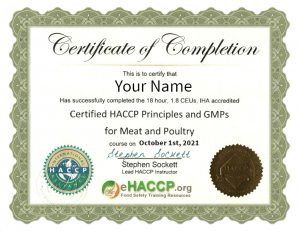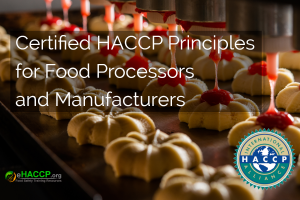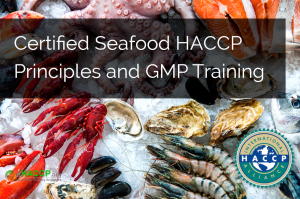Understanding the basics of a HACCP food safety plan is foundational to unlocking operational excellence in any food production or handling operation.
— Daniel Dahoust
LUNENBURG, NS, CANADA, March 20, 2024 /EINPresswire.com/ — Understanding the basics of a Hazard Analysis and Critical Control Points (HACCP) food safety plan is foundational to unlocking operational excellence in any food production or handling operation. At its core, HACCP is a systematic preventive approach to food safety that identifies physical, chemical, and biological hazards in production processes that can cause the finished product to be unsafe. It designs measurements to reduce these risks to a safe level.
This methodology is important because it moves businesses from reacting to contamination incidents after they occur to preventing them at their inception.
Implementing a HACCP plan involves conducting a thorough hazard analysis, identifying critical control points (CCPs), establishing critical limits for each CCP, monitoring procedures for these points, corrective actions when monitoring shows that a CCP is not under control, verification procedures to confirm the efficacy of the HACCP system and record-keeping. The importance of this process cannot be overstated; it ensures the safety of food products, thereby protecting consumers’ health while simultaneously bolstering the credibility and efficiency of the food industry operations.
In doing so, it supports operational excellence by embedding quality assurance directly into production processes.
Identifying Critical Control Points: How To Implement Preventive Controls In Your Food Safety Plan
Identifying Critical Control Points (CCPs) is a cornerstone in implementing preventive controls within a HACCP (Hazard Analysis and Critical Control Points) Food Safety Plan. This process involves a meticulous analysis of each step in the food production and distribution chain to pinpoint where hazards—be it biological, chemical, or physical—could potentially occur. The objective is to establish measures that can effectively mitigate these risks before they compromise food safety.
The implementation of preventive controls starts with a thorough hazard analysis. By understanding the nature of potential hazards, businesses can better identify which steps in their operations are critical to ensuring food safety. Once these CCPs are identified, it’s essential to establish limits that must be met to prevent, eliminate, or reduce hazards to acceptable levels.
Monitoring procedures then become vital. They ensure that each CCP stays within its established limits. This requires regular testing and verification processes, which provide documented evidence that the controls are effective. Corrective actions must be predetermined and ready to implement should monitoring indicate that a CCP is not under control, thereby ensuring the continuous safety of the food product through proactive prevention rather than reactive measures.
Mitigating Risks and Ensuring Compliance: The Role of Supplier Management And Traceability Systems
In the realm of operational excellence within food safety, the meticulous management of suppliers and the implementation of robust traceability systems are fundamental. These elements serve as critical pillars for mitigating risks and ensuring compliance with stringent regulatory standards. Effective supplier management begins with a comprehensive vetting process, ensuring that all suppliers adhere to the same rigorous food safety standards that are expected within your own operations.
This alignment is crucial for maintaining the integrity of the supply chain, minimizing the risk of contamination or non-compliance that could compromise consumer safety and trust. Regular audits, coupled with transparent communication channels, further fortify this relationship, enabling quick response to any potential issues. Complementing supplier management, traceability systems provide a seamless tracking mechanism for every ingredient throughout its journey from farm to fork.
These sophisticated systems not only facilitate rapid response in the event of a food safety incident but also enhance accountability at each step of the supply chain. By maintaining detailed records, companies can swiftly isolate affected products, minimizing health risks to consumers and financial impacts on businesses. Together, diligent supplier management and effective traceability systems form an indispensable duo in unlocking operational excellence through a HACCP Food Safety Plan.
Responding To Crises: Developing Effective Recall and Withdrawal Procedures in Your HACCP Plan
In the dynamic landscape of food production and distribution, even with the most robust Hazard Analysis and Critical Control Points (HACCP) food safety plan in place, the potential for a crisis looms. Recognizing this possibility, an indispensable component of operational excellence is developing effective recall and withdrawal procedures within your HACCP framework. This pre-emptive strategy not only mitigates risks but also underscores a commitment to consumer safety and regulatory compliance.
Effective recall and withdrawal procedures begin with clear identification and traceability systems for all ingredients and products. This allows for swift action when a potential hazard is identified, ensuring that affected products can be quickly removed from shelves before reaching consumers. Communication plays a pivotal role; promptly notifying stakeholders, including regulatory bodies, distributors, retailers, and consumers about the issue is crucial for maintaining trust.
Moreover, rehearsing these procedures through regular drills can ensure that when a crisis does strike, the response is second nature to your team. Such preparedness minimizes health risks to consumers and financial losses to your business while upholding your reputation for quality and reliability in the face of adversity.
Embracing Innovation: Leveraging Emerging Technologies for Business Continuity and Sustainability in Food Safety Operations
Embracing innovation within the realm of food safety operations is pivotal for businesses aiming to achieve operational excellence. The integration of emerging technologies into a Hazard Analysis and Critical Control Points (HACCP) food safety plan not only enhances business continuity but also propels sustainability efforts forward. Advanced digital tools, including blockchain for traceability, IoT sensors for real-time monitoring, and AI-driven analytics for predictive risk assessment, are revolutionizing how food safety processes are managed and optimized.
These technologies enable more precise tracking of the supply chain, allowing businesses to quickly identify and mitigate potential hazards before they escalate into more significant issues. For instance, IoT sensors can monitor temperature conditions in real-time during transportation and storage, ensuring that perishable goods are maintained in optimal conditions to prevent spoilage or contamination. Meanwhile, AI-driven analytics can predict potential outbreaks or contamination events based on historical data and current trends, allowing companies to proactively adjust their operations.
By leveraging these emerging technologies within their HACCP plans, businesses not only enhance their ability to safeguard public health but also demonstrate a commitment to sustainability by reducing waste and improving efficiency. This innovative approach fosters a culture of continuous improvement and operational excellence in the dynamic landscape of food safety operations.
In order to create and maintain your HACCP plan, and get HACCP certified, HACCP training and HACCP certification is available at ehaccp.org.
Stephen Sockett
eHACCP.org
+1 866-488-1410
email us here
Visit us on social media:
Facebook
Twitter
LinkedIn
YouTube
Other
![]()
Originally published at https://www.einpresswire.com/article/697333398/unlocking-operational-excellence-the-power-of-a-haccp-food-safety-plan









